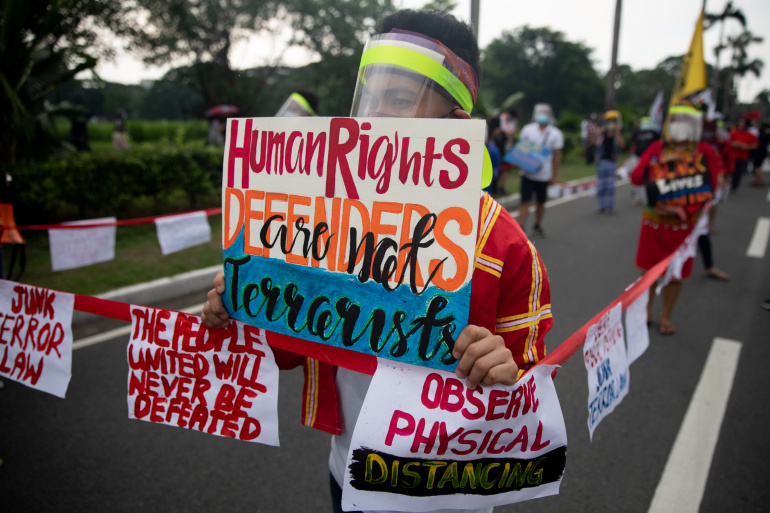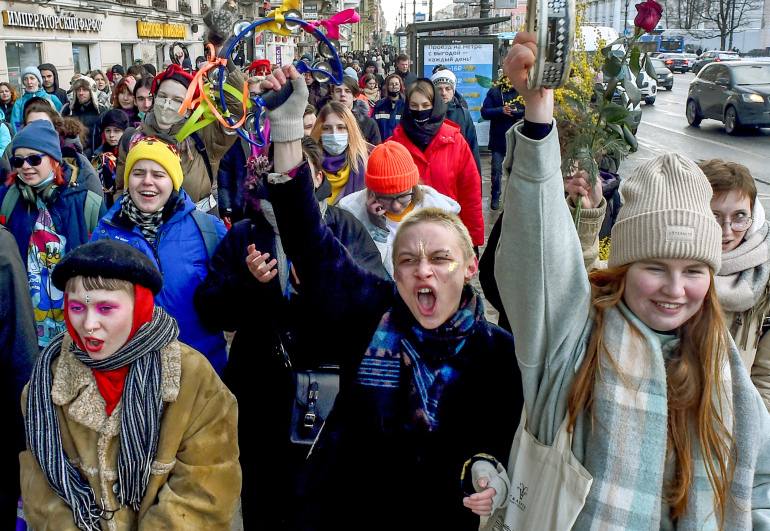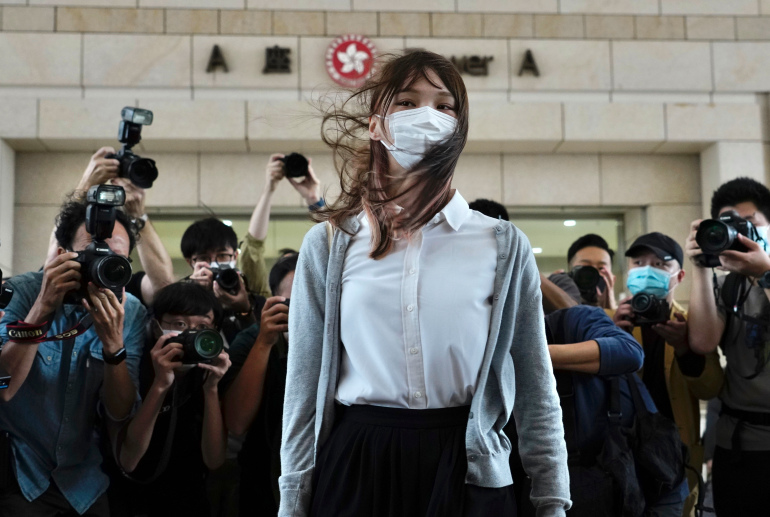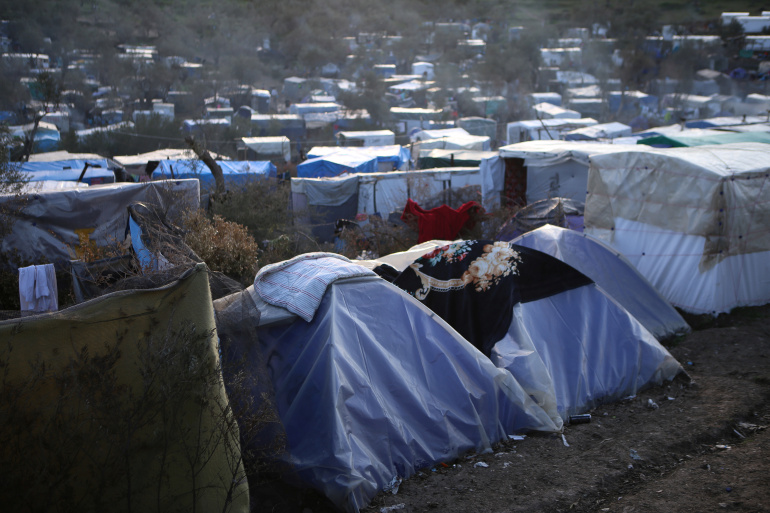In its latest annual report detailing the state of human rights across the world, Amnesty International denounces world leaders for weaponising the COVID-19 pandemic to ramp up their assault on basic rights, while failing to stand up to the challenges posed by the coronavirus.
In the 400-page report published on Wednesday, Amnesty’s newly appointed Secretary General Agnes Callamard described 2020 as “366 days that saw the fostering of lethal selfishness, cowardice, mediocrity, and toxic failures from xenophobia and racial hatred”.
Known for her bold assertions, Callamard is a human rights expert who has previously conducted investigations into extrajudicial killings as a United Nations’ special rapporteur – an independent role she held since 2016.
Her highest profile case was the murder of journalist Jamal Khashoggi by Saudi agents in 2018 at the kingdom’s consulate in Istanbul. Callamard’s probe concluded that Saudi Arabia was responsible for the extrajudicial execution. Following the investigation, a senior Saudi official reportedly issued death threats against her.
Al Jazeera spoke to Callamard about the report’s findings and how the COVID-19 pandemic has affected human rights issues around the globe.
Al Jazeera: What struck you most about the findings of the report?
The indivisibility of human rights, the interdependency between civil and political rights, economic and social rights. People around the world were the victims of inequity and discrimination, often in alliance with the repression of their political and civic rights. [It shows] a complete interdependence of how the true system of violence functions.
In 2020 governance and common responsibility came from the people on the streets. It came from those who worked in hospitals to heal us, who cleaned the streets, who fed us, who brought us packages to our homes, who marched against oppression. Leadership came from the most vulnerable groups, without whom we would have not survived the pandemic.
2020 is the history of who had less, gave the most and received the least. On the other hand, the leaders of the world, whether political or commercial, failed us.
Their response to the pandemic did not take into account the vulnerability of individuals and groups, such as migrants, refugees and women, who are on the receiving end of very problematic policies. That is what 2020 is about: the result of years of neglect where inequalities and discrimination were not taken as a priority as they should have been. On the contrary, policies that were implemented increased such inequalities.
Al Jazeera: You describe 2020 as the result of a ‘broken system’ that needs a ‘reset and reboot’. How do we achieve this?
The first step that must be immediately taken is to ensure that everyone around the world gets access to vaccination free at the point of use. This means sharing the knowledge to produce and multiply vaccine production with countries around the world. Otherwise, we are not going to cope as an international community.
It is essential that countries that were already among the most impoverished around the world, and that have suffered even more during the pandemic, are being offered outright debt relief. Not a temporary one such as agreed during the G20 meeting [debt payment has been suspended for low-income countries, but they are expected to return the money with interest later].
 A protester, maintaining a social distance from others to prevent the spread of COVID-19, holds a placard that reads ‘Human Rights Defenders are not terrorists’ during a rally against an anti-terror bill that was approved by President Rodrigo Duterte the previous day, in Quezon City in the Philippines [File: Eloisa Lopez/Reuters]
A protester, maintaining a social distance from others to prevent the spread of COVID-19, holds a placard that reads ‘Human Rights Defenders are not terrorists’ during a rally against an anti-terror bill that was approved by President Rodrigo Duterte the previous day, in Quezon City in the Philippines [File: Eloisa Lopez/Reuters]
At the country level, there needs to be a reset. This means that there must be a true understanding of the politics of the past 10 years that have resulted in increasing poverty in 2020. Whether they are on public investments, public services, social security, protection of freedom of assembly … all the measures that made the world unable to cope with a pandemic. They must be identified, named and changed.
In concrete terms, this could mean a taxation system that is fair, that allows a fair taxation on companies around the world, in particular, companies that keep making money on fossil fuels. We need taxation geared toward the response to climate change. We need to think of social security because it is unacceptable that people are confronted with the direst economic situation because for years we have neglected to invest in social security systems.
There is no fast solution but there must be commitments to address all these measures that made us so vulnerable to the pandemic.
 Members of a Russian feminists’ movement march to mark International Women’s Day along a street in central Saint Petersburg [File: Olga Maltseva/AFP]
Members of a Russian feminists’ movement march to mark International Women’s Day along a street in central Saint Petersburg [File: Olga Maltseva/AFP]
Al Jazeera: Is the very notion that human rights matter under assault?
2020 was a year where we understood that the assault against the human rights of some becomes an affront of human rights of all. Human rights have been attacked as an ideal for some years, a number of governments are insisting that human rights are not important and that there are other values, such as national interests and sovereignty, that should dominate.
With that language, the whole world is going down the drain. Because without global solidarity you cannot fight a pandemic.
Al Jazeera: What challenges do new technologies pose to human rights?
The challenge that we are confronting as a human rights organisation and as an international community, is that there are a multiplicity of attacks on human rights and that each of these attacks has a multiplicity of dimensions. The new industrial revolution can have some positive aspects to human rights production, but it is a revolution that is progressing very fast and we do not understand it very well.
Every month we are witnessing new attempts by a number of governments and companies to use artificial intelligence around facial recognition, use of drones for policing purposes or killings. The multiplication of weapons is part of our environment and they are a major source of challenges for human rights protection.
 Hong Kong pro-democracy activists Joshua Wong, Agnes Chow and Ivan Lam were taken into custody after they pleaded guilty to charges related to a demonstration outside police headquarters during anti-government protests last year [File:Vincent Yu/AP]
Hong Kong pro-democracy activists Joshua Wong, Agnes Chow and Ivan Lam were taken into custody after they pleaded guilty to charges related to a demonstration outside police headquarters during anti-government protests last year [File:Vincent Yu/AP]
Al Jazeera: What are the biggest challenges the Middle East region is facing in terms of human rights abuses?
The Middle East is one region that is suffering the brunt, not only of the pandemic, but also of geostrategic considerations. It’s a place very much neglected by the international community, except for profit and military presence. It is the place where justice and accountability have not received the attention that they deserve and where the international community has waged war, without being able to think of a post-war scenario and support the search for justice.
The region is characterised by the multiplicity of regimes that are repressing, stifling dissent and imprisoning all those that are critics of the authorities. It is a place where conflict between regional and superpowers lead to an enormous amount of victims. We have seen situations probably amounting to genocide with what Daesh [ISIL, or ISIS] has done, crimes against humanity in Syria as well as war crimes in Yemen.
Al Jazeera: What has been the role of the United Nations this past year and has it been effective in defending human rights?
The UN is a product of member states and, in 2020, the world failed to act and think globally.
The multilateral instruments were not able to rise to the challenge. At the UN Security Council, even before 2020, we have seen on a regular basis the use of veto power by countries preventing global action. So at the moment, and as further revealed by 2020, the multilateral instruments are not fit for purpose.
 A view of a makeshift camp for refugees and migrants next to the Moria camp, on the island of Lesbos, Greece [File: Elias Marcou/Reuter]
A view of a makeshift camp for refugees and migrants next to the Moria camp, on the island of Lesbos, Greece [File: Elias Marcou/Reuter]
Al Jazeera: You recently revealed that an official from Saudi Arabia issued death threats against you while you were working as the UN special rapporteur for extrajudicial executions. What does that say about how far rights abuses can reach?
It says that some governments around the world, in my case the one of Saudi Arabia, are prepared to target and threaten an international expert nominated by member states to monitor the human rights situation. And they are threatening her because she is doing her work. It means that there is no safe space, including the diplomatic one, despite being safer than many other spaces.
We are confronting a world where governments are prepared to silence and to censor anyone criticising them even those that are outside the boundaries of their countries. We are facing a world where governments are prepared to go extra-territorially to engage in act of espionage that can lead to disappearances, to murder – such as in the case of Jamal Khashoggi.
There is a multiplication of attempts by governments to silence anyone, anywhere they are, for what they are doing so that is a global phenomenon and that is one of the lessons we need to extract. We need to be far more agile at responding to those situations and to be far more aware that there is an increase in targeting individuals, wherever they are.





